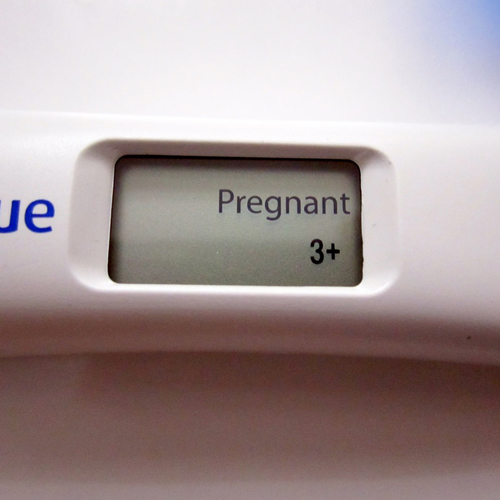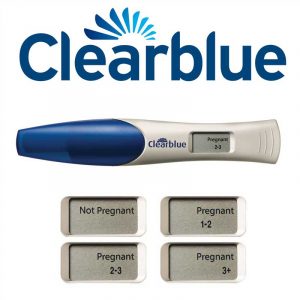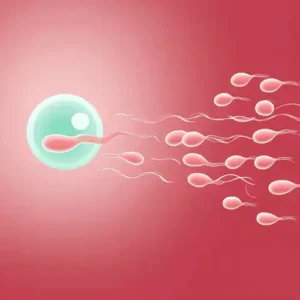In today’s modern world, taking an early pregnancy test is very easy and can be done in minutes in the privacy of your own home. Just nip to the toilet and pee onto a plastic stick and you will know in minutes if you are pregnant or not. However this kind of convenience is relatively new, as this article will explain.
The First Home Pregnancy Test
It was in 1976 that the first early pregnancy test kit hit the shops. Before this time women had to rely on their body’s signals and feminine intuition before finally going to see a doctor to confirm if they were, or were not, pregnant.
If you are trying to conceive the whole “am I or am I not” moment is massive and convenient home pregnancy testing has taken a small fraction of the stress away from what can be a very emotional time for a couple.
At Zoom Baby we are often asked advice of which pregnancy test to use and when to take a test. Certainly, testing repeatedly can be expensive and trying so we do try and offer as much help as we can to reduce both the cost and disappointment that can occur at this time.
With so many pregnancy tests on the market it can also be difficult deciding which one to buy – do you need a normal one, or should you buy an early pregnancy test?
Here’s some background on home pregnancy testing that might be useful at the time you might want to start testing to see if you are indeed pregnant,
How does an Early Pregnancy Test work?
All pregnancy tests, including early pregnancy tests, work by detecting the pregnancy hormone hCG (Beta Human Chorionic Gonadotropin), in urine. A soon as an egg is fertilised and implanted into your uterus, hCG will start to be produced by the cells that eventually form the placenta of your baby. Normally, HCG can be detected in urine from between 6 and 14 days after fertilisation.
We always advise that the best opportunity to test for pregnancy is the time after your period has been missed and when you have started to feel some pregnancy symptoms. Taking a pregnancy test at this stage provides confirmation of what is already strongly suspected.
Waiting so long is easier said than done! For women who are trying to conceive, curiosity and desperation can take over and the urge to test can start within days of intercourse having taken place.
hCG hormone and Pregnancy
Taking a very early pregnancy test can give unreliable results for the following reason:
To get pregnant a woman will need to have had intercourse during her “fertile” time (It’s fairly easy to determine this time if you are using Ovulation Tests or tracking your BBT)
Timing is everything! Sperm can take up to 12 hours to swim up the the Fallopian tube where they can survive for several days. But, only 24 hours after ovulation has taken place, the egg will start to degrade and fertilisation will no longer be achievable.
After the egg has been fertilised it must make the journey down the fallopian tubes and into the uterus, where it will then implant into the lining. Implantation normally take place 6 – 10 days after ovulation.
Only after all this has taken place will the body start to secrete the hCG hormones that need to be detected by a pregnancy test!
When Should I Take an Early Pregnancy Test?
It always a good time to take a pregnancy test if you are starting to experience any of the 10 Early Signs of Pregnancy.
The very earliest you can test for pregnancy is 7 days past ovulation (DPO). It is important to make sure that you do not drink too much before taking a test as this can dilute the levels of hCG in your urine. You should use an early pregnancy test at this time.
Testing any sooner than 7 DPO is not advisable as it is unlikely that the embryo would have had time to implant before then. Even testing at 7 DPO is risky as you are also assuming that you’re exactly right in your prediction of when you ovulated.
For most women it is possible to get a positive at 9 – 11 DPO. To do this you will need to use a specialist, early pregnancy test such as the First Response Early Result Pregnancy Test. This tests uses innovative technology that can detect pregnancy hormones earlier, as early as 6 days before your period. For a small number of women, it is possible that a positive result will not show at this stage when using an early pregnancy test.
The optimum time to test is 14 DPO which is normally the day your period is due. Certainly. many early pregnancy tests will give a more reliable result at this stage. By now, the egg should be firmly in place and producing enough of the hCG hormone to easily be picked up by a pregnancy test.
For some women, a positive results is not possible until 15 – 18 DPO. Often this will be after they have missed their period. An even smaller minority of women can take even longer to get a positive test, sometimes not until they are a week or two late.
If your period has not arrived and you are still getting a negative result on your regular or early pregnancy test, it probably best to talk to your GP. Factors such as stress can often cause delayed ovulation which means you may not actually be late.
Are All Early Pregnancy Tests the Same?
The simple answer to this question in “No!”. Not every early pregnancy test is the same, some are more sensitive than others, meaning that they can be used earlier. This is because a more sensitive early pregnancy test can pick up lower levels of hCG in your body. It is his type that we know as “Early Pregnancy Tests.”
Every pregnancy test will have its sensitivity printed on packet or wrapper of the test. The tests measure in milli-International Units (mIU) per millilitre. The lower this value the higher the sensitivity of the test. Zoom Baby Ultra Early Pregnancy Tests, for example, are calibrated to detect hCG at 10 mIU/ml. this makes them much more sensitive than our regular pregnancy tests which detect hCG at 25 mIU/ml.
For many tests, it is recommended that you use first urine of the day as this contains higher concentrations of hCG, which build up overnight.
A midstream test requires you to simply pee on a stick. Other types of test may take the form of strips which you then dip into a container containing a urine sample. hCG test strips tend to be cheaper than midstream tests but just as reliable..
When it comes to results, some early pregnancy tests may show blue or pink lines. Other tests show a plus or minus sign. Digital tests, such as those manufactured by Clearblue, show the words”pregnant” or “not pregnant” on them and can even give you an idea of how long ago you conceived.
Are Home Pregnancy Tests Accurate?
As long as you follow the instructions to the letter, home pregnancy tests are accurate. (We’ve identified 5 factors that could influence pregnancy test results).
Some test can be easier than others to interpret, so if possible try and use a couple of different ones to see which one suits you best. (Zoom Baby has a large selection of reliable, regular and early pregnancy tests, so you should be able to select one or two brands without having to break the bank!)
If you test too early using an early pregnancy test, you might get a false positive if their is not enough hCG in your system, so it is worth testing again a few days later.
A false positive that tells you that you are pregnant, when you are not, can also happen. Such incidents are rare but some fertility drugs, which contain hCG, have been known to influence results.
Do I Need a Blood Test Confirmation?
Generally you don’t. If your pregnancy test is giving you a positive results and you have missed your period, it is safe to assume that you are pregnant.
A blood test is sometimes necessary if, in early pregnancy, there is bleeding and some uncertainty about whether the pregnancy is continuing,. A blood test can assess hCG levels at this point and if they are increasing this can indicate that the pregnancy is progressing healthily.
In some cases, the doctor may also recommend a blood test to confirm pregnancy if you have a history of miscarriages or ectopic pregnancies. It can also help in determining the gestational age of the pregnancy accurately. However, in most cases, a urine pregnancy test is sufficient to confirm pregnancy.
It is important to remember that a blood test for pregnancy can detect very low levels of hCG hormone, which may not be detectable in a urine pregnancy test. Therefore, if you have taken a home pregnancy test and the result is negative, it does not necessarily mean that you are not pregnant. It is always best to consult with your doctor if you have any doubts or concerns about your pregnancy.
Our Recommended Product
Looking for a reliable early pregnancy test? We highly recommend the Clearblue Digital Pregnancy Test with Weeks Indicator. This smart device doesn’t just tell you if you’re pregnant – it also shows how many weeks along you are. The clear digital display removes any doubt about those tricky line readings.
What makes this test special is its Smart Dual Sensor technology, which gives you results up to 4 days before your period is due. It’s over 99% accurate from the day of your expected period, making it one of the most reliable tests available.
The test is incredibly simple to use – just hold the absorbent tip in your urine stream for 5 seconds. Within 3 minutes, you’ll see either ‘Pregnant’ or ‘Not Pregnant’ clearly displayed. If you’re pregnant, it will also show how many weeks since conception: 1-2, 2-3, or 3+ weeks.
Most UK doctors recommend this test, and it’s one of our bestsellers. While it’s slightly pricier than basic strip tests, the clarity and weeks indicator feature make it worth the extra cost for many women.
Photo Credit: “IXU_0310” by Leon Brocard is licensed under CC BY 2.0
Zoom Baby is a leading supplier of Pregnancy Tests and Ovulation Test Kits
This post was originally published in 2017. It was last updated in January 2025.






